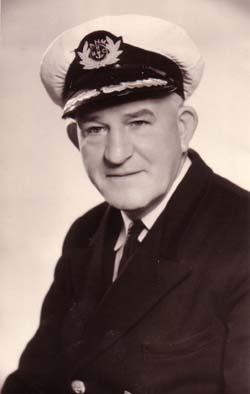He was the eldest of two brothers and six sisters. On leaving school at 14 years he entered an apprenticeship as coach painter but always had a strong desire to go to sea, which was encouraged by his mother, and became a member of the Belfast Sea Cadets. In July 1921 he joined the Prince of Wales Sea Training Hostel in London. He quickly gained promotion during his period of training, was awarded the HRH Prince of Wales Certificate for the year 1921/1922 and left the Hostel on 28th December 1921 for Southampton to join his first ship, the SS Brandenburg, as Deck Boy on its voyage to Bombay. During the following 12 years he served on 12 ships, mainly foreign-going and progressed rapidly through the ranks until he got his first command in April 1934 (having obtained his Foreign-going Masters Certificate in June 1931) of the SS Isadora belonging to John Kelly Ltd of Belfast. He was particularly proud to receive a personal letter of congratulations on his achievement as the first 'Old Hostel Boy' getting a command from Admiral E.F Bruen, Chairman of the PWSTS. In June 1933 he had married Kathleen Johnston who was closely connected with the sea, her father having been a Master Mariner and Belfast Harbour Pilot and on her maternal side her great-great grandfather was Charles Connell who founded a shipbuilding business in Belfast in 1808 and which built, amongst many other ships, the Aurora, the first passenger steamer constructed in Ireland in 1938. Out of the union I was born in September 1934 and my father soon after joined the Pilotage service of the Port of Belfast. After several years in the pilotage service he became a Berthing Master at the Port. A year later after the outbreak of war he was appointed Master of the MV Duchess of Abercon which had been converted by the Harbour Commissioners to a fire fighting vessel. At Easter 1941 Belfast was heavily bombed by the Germans and the docks and shipyard were the principle targets. A number of ships were hit and several sunk and for some time immediately after mines were found at various locations in the docks. On one occasion the Duchess of Abercorn left her berth to allow a Head Line vessel to berth but unfortunately its greater draught detonated the mine and the ship sank at berth. In the late 1941 he was seconded to the Admiralty and following a training period was appointed in charge of Admiralty Floating Dock 21 which was berthed in Belfast Harbour. Over a period of approximately 2 years the Dock facilitated the repair of many warships of the British and American navies and in some instances ships were cannibalised by being cut in two with lightly damaged bow sections being welded to similar stern sections. Towards the end of the war the Floating Dock was decommissioned and my father returned to his position as Berthing Master at the Port but was, shortly after, appointed Deputy Harbour Master and later Assistant Harbour Master until his retirement in 1969. During his year with Belfast harbour he became a Founder Member of the Belfast Master Mariner's Club and served as Storekeeper (or in layman's terms Treasurer) until his retirement when he was made Honorary Life Member. On retirement he moved to Coleraine, where I lived, and he often visited, with his three grandsons, the harbour at Coleraine to see the small coaters that berthed there. He was delighted when his grandson Stuart Robert decided to follow in his footsteps by joining BP Shipping as a Deck Cadet and despite his many years away from the sea he was still able to offer Stuart helpful advice on seamanship and navigation and reminiscences of life at sea were the order of the day. He predceased his beloved wife in July 1986 at the age of 84 and is buried in the North Coast town of Portstewart within sight of the sea. David J Wilson |
 My father was born 2nd July 1904 at 47,
Carnalea Street, Belfast within a short distance of the Belfast harbour
Estate. His father was a coach painter on his business in premises
attached to his home.
My father was born 2nd July 1904 at 47,
Carnalea Street, Belfast within a short distance of the Belfast harbour
Estate. His father was a coach painter on his business in premises
attached to his home.